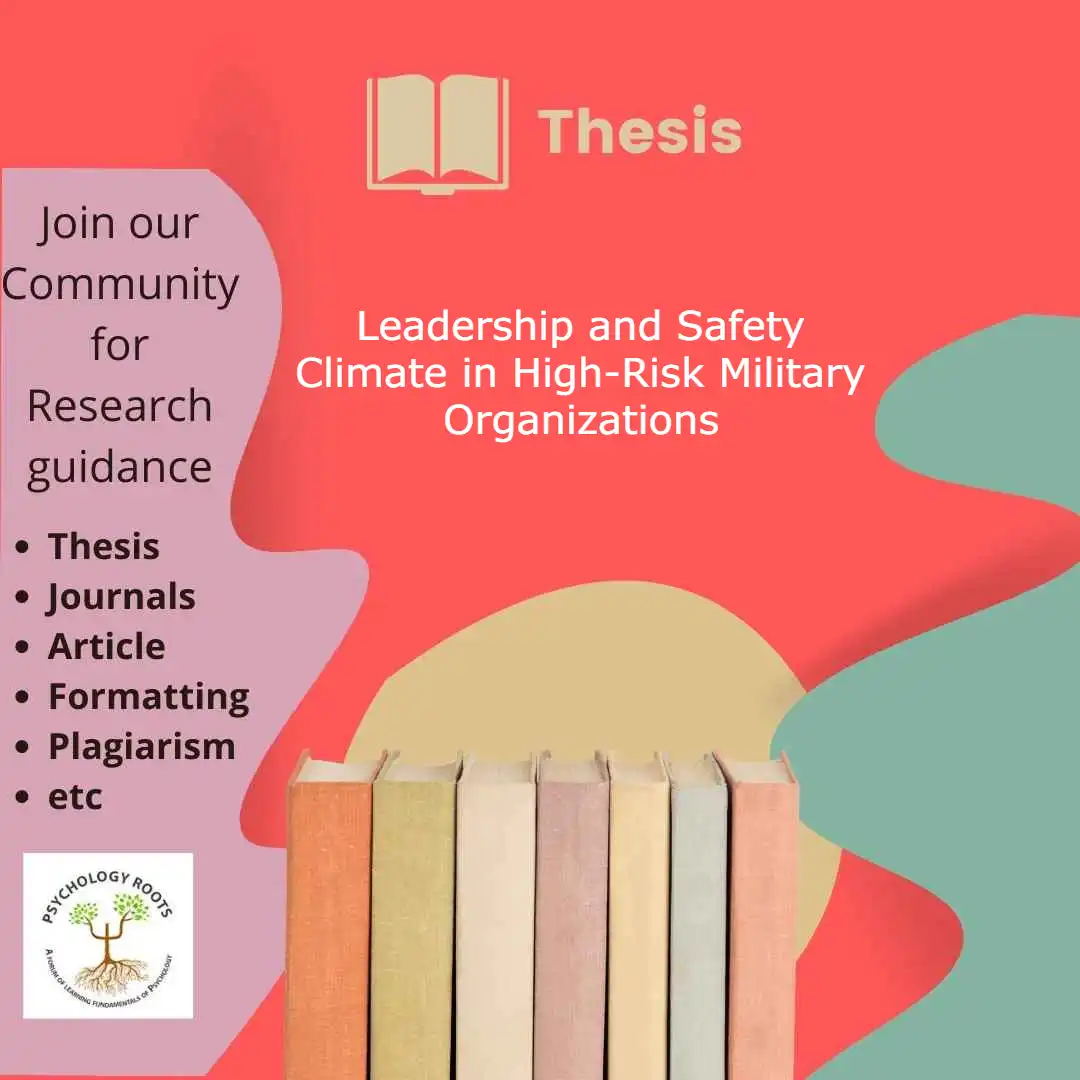Table of Contents
Leadership and Safety Climate in High-Risk Military Organizations
Here in this post, we are sharing the full Psychology thesis on “Leadership and Safety Climate in High-Risk Military Organizations“. You can read the abstract of the thesis with a download link. We have thousands of thesis in our collection (See articles). You can demand us any article related to psychology through our community, and we will provide you within a short time. Keep visiting Psychology Roots.
Abstract of the thesis
Preventable accidents and mishaps continue to degrade the readiness of U.S. military forces. In 2006, the National Safety Council reported an annual rate of over 30 accidental fatalities per 100,000 Department of Defense members and estimated that preventable injuries and illnesses cost the department approximately $21 billion per year. Reducing these occurrences was the policy mandate of the Secretary of Defense in 2003. He challenged the military service secretaries to reduce their mishap rates by 50 percent over a two-year period ending September 30, 2005. While each of the military services formulated its own compliance strategy, none of them met the reduction goal. In some cases, the mishap rate actually increased.

Leadership and Safety Climate in High-Risk Military Organizations
The purpose of this dissertation is to evaluate the Department of the Navy’s (DON) policy compliance strategy and to assess its shortcomings and areas for future improvements. The Navy focused their efforts on leadership-intervention best practices designed to elevate the safety climate in their high-risk units, primarily their aviation components. These units contribute almost 90 percent of the annual mishap cost due to preventable accidents. DON policy-makers theorized that certain leadership interventions would improve safety climate thereby reducing the likelihood that unit members would engage in unsafe behavior both on and off the job.
This dissertation evaluates the validity of that general theory, and the appropriateness of the specific leadership interventions chosen, in two distinct data collection and analysis phases. In the first phase, statistical analysis is conducted on a safety-climate survey database maintained by the Naval Post-Graduate School containing 20,000 Navy and Marine Corps military survey respondents assigned to F/A-18 aircraft squadrons completed over the past 5 years. In Phase 2, Commander, Naval Air Forces Atlantic Fleet authorized climate research in four Navy F/A-18 squadrons located at Oceana Naval Air Station. Upon analysis, the intervention methods implemented in the Navy’s mishap reduction strategy showed little correlation with safety climate improvement. Phase 2 analysis identified several organizational programs and specific leadership qualities that correlate with elevated safety climate and revealed a preliminary causal relationship between safety climate and safety performance.
Researcher of the Thesis
- Mark H. Adamshick
Avail Thesis [sociallocker id=64051]
[/sociallocker]
Need help in Research:
Are you struggling in research? Don’t Worry, We provide you with complete guidance and support free and quickly. Just need to create a query in our community. We also offer paid services such as:
- Thesis writing
- Article writing
- Statistical analysis
- Reference according to APA
- APA Formatting
- Supervisions
- Courses and Training
Contact us for the best quality free and paid services. info@psychologyroots.com or (+92-3336800644)
Information:
The purpose of our website is only to help students to assist them in finding the best suitable instrument for their research especially in Pakistan where students waste a lot of time in search of the instruments. It is totally free of cost and only for creating awareness and assisting students and researchers for good research. Moreover, it is necessary for you to take the permission of scales from their representative authors before use because copyrights are reserved by the respected authors.
Help Us Improve This Article
Did you find an inaccuracy? We work hard to provide accurate and scientifically reliable information. If you have found an error of any kind, please let us know.
Add comment. we appropriate your effort.
If you have any scale or any material related to psychology kindly share it with us at psychologyroots@gmail.com. We help others on behalf of you.
Follow